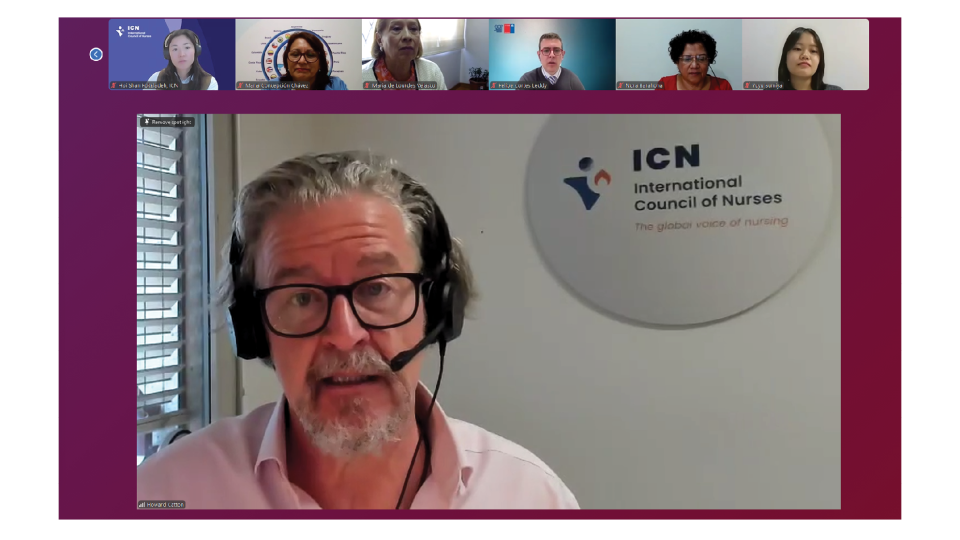Major ICN webinar delivers insights into strategies for nurse wellbeing at organizational, national, and global levels

On Tuesday 30th September, the International Council of Nurses (ICN) hosted a significant webinar to address urgent challenges to nurse well-being, with a focus on the Americas region.
The webinar drew 600 participants from 101 countries, highlighting the truly global nature of these issues. It was moderated by ICN Senior Policy Adviser Hoi Shan Fokeladeh and brought together nursing leaders from across the Americas to discuss strategies and insights for improving the health and well-being of nurses globally. Speakers shared case studies, evidence-based frameworks, and regional perspectives, highlighting both the challenges nurses face and the urgency of effective solutions to address them.
ICN President José Luis Cobos Serrano opened the webinar with a strong message grounded in data from the State of the World’s Nursing report and ICN’s International Nurses Day report. He told participants:
“The evidence is clear. When we care for nurses, we care for entire populations. Supporting our nursing workforce, the world’s largest health profession at 30 million strong, strengthens health systems, improves patient outcomes, and creates more resilient, equitable and prosperous societies.”
ICN’s CEO Howard Catton then presented global data on nurse wellbeing and policy solutions, painting a sobering picture of challenges since COVID-19, which created what ICN described as “mass traumatization” of the nursing workforce. He underscored major gaps in support for nurses’ health and wellbeing, including adequate working conditions, mental health supports, and protection from violence and attacks. Despite the scale of these issues, Mr Catton highlighted clear solutions at organizational, national, and international levels, including global frameworks such as ICN's Charter for Change and WHO's Global Strategic Directions for Nursing and Midwifery. He concluded:
“We have the strategies which tell us what to do, and we have the case studies to show that they work in practice, and we have the economic evidence to show that they are economically beneficial, with lost nurse productivity potentially costing $100-300 billion annually. There is nothing to stand in the way of countries doing more to protect the mental health of our nurses and our health workers.”
Speakers then presented evidence-based solutions across contexts:
-
ICN Board member Nora Barahona de Peñate of the National Nurses Association of El Salvador shared insights from ICN’s Council of National Nursing Association Representatives Policy Forum, emphasizing how creating positive working conditins strongly contribute to nurses’ wellbeing and highlighting successful examples in different countries, ranging from counselling programmes to legal reforms strengthening legislation for nurses' occupational injuries.
-
From Chile, National Director of Nursing Felipe Cortes Leddy presented his government's systematic approach to nurse well-being, including development of competency frameworks, formal recognition of nursing specialties, and strengthening of professional development, care management, advocacy, and intersectoral coordination.
-
Yuyu Sumiya, representing the Japanese Nursing Association and ICN Alliance of Students and Early Career Nurses, provided critical insights into how well-being challenges begin during education, with 8.8% of new graduate nurses in Japan leaving within their first year, often citing mental health issues.
-
María Concepción Chávez, President of the Pan American Federation of Nursing Professionals (FEPPEN), emphasized the need for physical, mental, and emotional protection for nurses across Latin America and the Caribbean, as well as issues with nurse migration to higher-income countries, and discussed projects supporting nurses to lead not only in clinical areas but also in public decision-making.
-
María de Lourdes Velasco, President of the Ecuadorian Federation of Nurses, presented their Comprehensive Self-Care in Mental Health programme, which promotes self-care and healthy habits, continuous training and clinical supervision, emotional regulation strategies, and psychological support through therapy and group sessions.
-
Christine Pabico from the American Nurses Association presented the Pathway to Excellence® framework, which recognizes healthcare organizations meeting six standards including shared decision-making, leadership, safety, quality, well-being, and professional development, as well as the the Well-being Excellence framework, which provides a mechanism to assess effectiveness of well-being programmes.
The webinar concluded with a powerful call to action from Howard Catton, who emphasized that nursing leadership is critical to bridging the gap between policy and implementation:
"We have powerful evidence both about the scale of nurse well-being challenges and the effective solutions. What remains is the political will to implement these proven strategies at organizational, national, and global levels. If we get this right, we deliver on the rights of nurses, we improve patient safety and quality, we strengthen our economies, and we advance global health. So, let's go out there and advocate and be champions for ourselves, for our profession, for our patients, for the world."
Webinar outcomes
The webinar generated several key outcomes that will drive forward the global agenda for nurse wellbeing:
— The comprehensive data shared throughout the session highlighted the full scope of challenges facing the nursing profession as well as solutions.
— Participants learned about valuable evidence-based resources for advocacy that will support their efforts to champion nurse wellbeing in their own countries, including the State of the World's Nursing report, ICN's International Nurses Day report, ICN's Charter for Change, WHO's Global Strategic Directions for Nursing and Midwifery, and the WHO Health Worker Safety Charter.
— The diverse range of successful case studies presented during the webinar will serve as a valuable resource for nursing associations and healthcare organizations worldwide, providing concrete examples of practical, measurable strategies for improving nurse wellbeing at all levels.
— The global participation from 101 countries demonstrated the wide-ranging nature of wellbeing challenges while also highlighting the importance of region-specific solutions that respect local contexts and resources.
— The session reinforced the urgent need for coordinated action across all levels of healthcare systems, from individual healthcare facilities to national policy development and international cooperation, and inspired all nurses to advocate for nurse wellbeing, which translates into patient wellbeing.